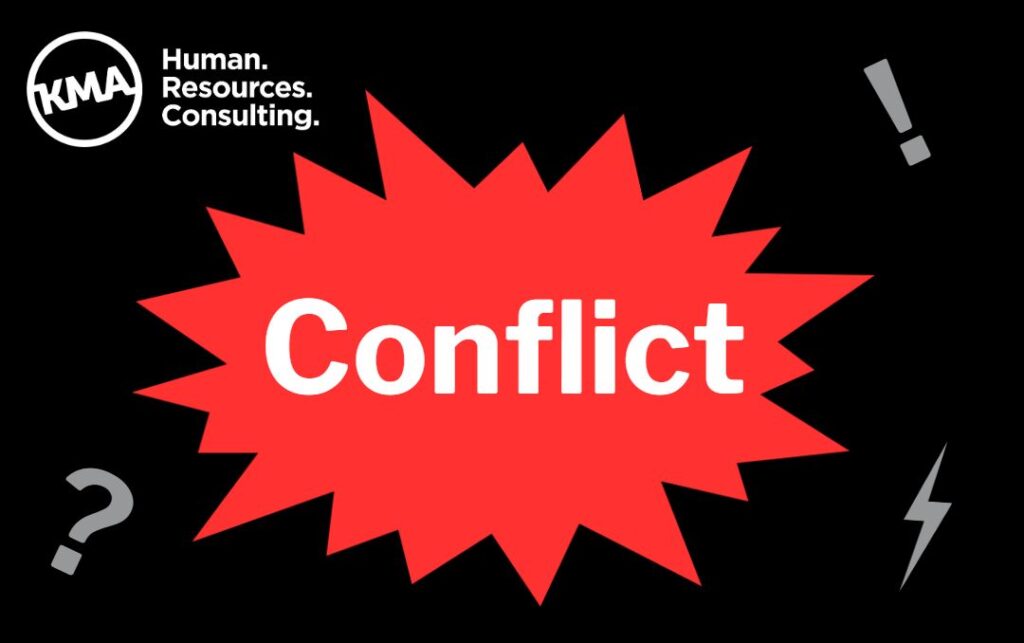 by the KMA Consulting Team
by the KMA Consulting Team
Workplace conflict can happen anytime two or more people are assigned a task together. Disagreements can arise from various sources, leading to a disruption in cooperation and efficiency. Kim Rummler, Senior Manager of HR Consulting & Operations at KMA, recently shared some of the biggest challenges our clients face today, “I’m seeing more conflict management and employee relations issues today than at any time in my career. They’ve become both more common and more complex. Employers are very challenged by this, and the tools in the HR toolkit can sometimes feel inadequate. We recommend impeccable documentation, clear communication, transparency, fair and consistent expectations, empathy, respect, patience, and the desire to do the right thing.”
Although managing conflict can be uncomfortable and time-consuming, we know that leaving it unresolved can severely damage an organization’s ability to function effectively. Amy Harkins, KMA’s Senior Manager of HR Consulting Operations, emphasizes the importance of not avoiding conflict, “Make sure you don’t avoid the situation. Avoiding the situation doesn’t tend to make it better; typically, it makes it worse, so we like to help with regular feedback as part of our advising support.” Regular feedback and proactive management are crucial in preventing conflicts from escalating and ensuring a cohesive work environment. Providing ongoing feedback helps employees stay aligned with organizational goals and addresses issues before they become significant.
Understanding the Causes of Conflict
Conflict in the workplace is a complex issue, often stemming from one or more root causes. Here are some common causes of workplace conflict:
- Miscommunication: Often, conflicts arise from misunderstandings rather than actual disagreements. Unclear communication or misinterpretation can lead to frustration and resentment. For instance, one person might be speaking vaguely, or a listener might misinterpret a statement, resulting in perceived slights or offenses that aren’t based on actual intent or reality.
- Incompatible Priorities: Conflicts frequently occur when individuals or teams have differing goals or priorities. For example, one team might prioritize speed while another prioritizes thoroughness, leading to clashes in workflow and expectations. Balancing these conflicting demands can be challenging and requires careful negotiation and compromise.
- Emotional Manipulation: Some individuals use emotional manipulation to achieve their goals, which can breed distrust and resentment among colleagues. A consistently tardy employee might garner sympathy by exaggerating personal hardships, but once their manipulation is uncovered, it can destroy trust and morale.
- Internal Competition: While healthy competition can drive performance, it can also lead to unethical behavior and undermine teamwork. When employees feel pitted against each other, they may resort to sabotage or withholding information.
- Poor Performance: An individual’s poor performance can trigger a domino effect, impacting the entire team and creating a breeding ground for conflict. When one person doesn’t pull their weight, it puts extra pressure on their colleagues, leading to frustration, resentment, and potential confrontations.
Effective Conflict Resolution Strategies
Addressing workplace conflict effectively requires a strategic approach and the implementation of practical solutions. Here are several strategies that can help in managing and resolving conflicts:
- Foster Open Communication: Encourage a culture of open and honest communication. Teach (and encourage) employees to express their concerns and viewpoints clearly and to listen actively. Good communication skills are essential for resolving misunderstandings and finding common ground. For instance, regular team meetings where employees can voice their concerns and suggest solutions can prevent small issues from escalating into major conflicts.
- Address Issues Promptly: Don’t wait for conflicts to escalate. Address behavioral and performance issues as they arise. By tackling problems early, you can prevent them from affecting the broader team and maintain a positive work environment. Immediate intervention can stop a minor disagreement from becoming a significant disruption.
- Set Common Goals: Help conflicting parties find common ground by focusing on shared objectives. When employees see that they are working towards the same goal, they are more likely to collaborate and compromise. For example, highlighting the company’s mission or specific project goals can help unify the team and redirect their focus toward achieving these targets collectively.
- Provide Conflict Resolution Training: Equip your team with the skills they need to handle conflicts effectively. Role-playing exercises and scenario-based training can help employees practice conflict resolution in a low-stress environment, preparing them for real-life situations. Training sessions can cover topics like active listening, empathy, and negotiation skills, which are crucial for effective conflict resolution.
- Promote a Positive Work Culture: Cultivate an environment at work where good intentions are assumed. Encourage employees to believe that their colleagues have positive intents, even when misunderstandings occur. This mindset can help reduce tensions and foster a more supportive atmosphere. Promoting teamwork and recognizing collaborative efforts can reinforce a positive culture and reduce instances of conflict. Conflict resolution is not just about addressing problems but also about building stronger, more resilient teams that can work together to achieve common goals. Investing in conflict resolution training and promoting a positive work environment are essential steps towards long-term organizational success.
By implementing these strategies and fostering a culture of open communication and mutual respect, you can effectively manage and resolve conflicts, creating a more harmonious and productive workplace.
If you’re facing employee relations challenges, no matter how big or small, KMA’s expert HR consultants are ready to help. Reach out to us to get started with your free discovery call.
